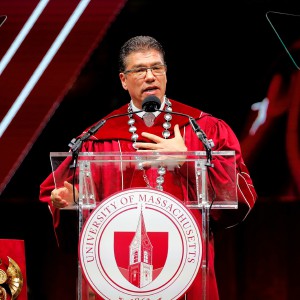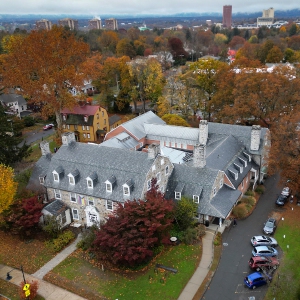Bill seeking ban on PFAS could affect regional high school track turf decision
| Published: 02-01-2023 8:46 PM |
AMHERST — Two bills focused on eliminating contamination from so-called forever chemicals, including legislation related to per- and poly-fluoroalkyl substances in sludge and fertilizer filed by Sen. Jo Comerford, D-Northampton, could soon be making their way through the state Legislature.
“I believe there’s a lot of momentum to ban PFAS,” Comerford said in a phone interview Tuesday, noting that the latest omnibus bill, known as the Mass PFAS Act, was developed out of the Legislature’s PFAS Task Force.
The legislation comes as the Amherst-Pelham Regional School District continues to move forward with a $4.7 million overhaul of the track and its interior field at the high school, with the preferred option an eight-lane track and an artificial turf field.
Whether this project would be in conflict with the proposed state legislation is a question being debated by some residents. The online Amherst Indy publication recently posted an article reporting that Comerford informed Town Council President Lynn Griesemer and Vice President Ana Devlin Gauthier in December, in a meeting that also included Rep. Mindy Domb, about the intentions of legislators to combat the sources of PFAS, including food containers, firefighting foam and car seats.
That meeting came before the Town Council adopting a resolution, on Dec. 12, that notes concerns about PFAS in artifical turf, a week after $900,000 in free cash was put toward the high school project.
“The Board of Health and members of the public have expressed concern about the health and environmental safety of artificial turf, particularly with respect to per- and poly-fluoroalkyl substances (PFAS), a group of chemicals often referred to as ‘forever chemicals,’” the resolution states.
It goes on to note that “the Amherst Town Council supports the need to further investigate the impacts of PFAS in all consumer products in our community, continuing to learn about the impacts of newer materials of artificial turf in our community, and taking legislative action to address such impacts.”
Comerford cautions that the conversations she had with councilors was informational and that she didn’t speak for or against the track and field project. In addition, she noted that while synthetic turf may come under a state ban if legislation is passed and signed into law, it’s not currently addressed in proposed legislation.
Article continues after...
Yesterday's Most Read Articles
 ‘Home away from home’: North Amherst Library officially dedicated, as anonymous donor of $1.7M revealed
‘Home away from home’: North Amherst Library officially dedicated, as anonymous donor of $1.7M revealed
 Super defers Amherst middle school principal pick to successor; one finalist says decision is retaliation for lawsuit
Super defers Amherst middle school principal pick to successor; one finalist says decision is retaliation for lawsuit
 Granby Bow and Gun Club says stray bullets that hit homes in Belchertown did not come from its range
Granby Bow and Gun Club says stray bullets that hit homes in Belchertown did not come from its range
 Connecticut man gets 8 years in Hadley shooting
Connecticut man gets 8 years in Hadley shooting
 Design Review Board in Amherst backs 5-story apartment project connected to old Hastings building
Design Review Board in Amherst backs 5-story apartment project connected to old Hastings building
 Political newcomer defeats Shores Ness for Deerfield Selectboard seat
Political newcomer defeats Shores Ness for Deerfield Selectboard seat
“The PFAS legislation has no position on turf as a concept,” Comerford said, adding that “there’s still a long way to go.”
Comerford said she has regular meetings with officials throughout her district and has brought up the PFAS legislative bills to provide information, but also didn’t suggest that any recommendations should be brought to the Town Council.
“It’s not my place to prescribe what should happen,” Comerford said.
The Indy story, titled “Griesemer Failed To Share Information On Proposed State PFAS Ban With Town Council,” was based on a series of emails to and from Griesemer received in a recent public records request made by resident Vira Douangmany Cage.
One of these emails shows that Comerford initiated the PFAS discussion as one of a number of issues.
“I’d love to add PFAS and turf, if it works for the town,” Comerford wrote. Griesemer then responded with PFAS as a topic.
Following the meeting, Griesemer attached a summary of the dozen topics that were discussed with Comerford and Domb, covering everything from the reimbursement rate used by the Massachusetts School Building Authority for school projects and available funding from the Massachusetts Board of Library Commissioners, to the process for special legislation filings and how money collected through the Fair Share Amendment would be used.
A paragraph summarizes the content on “PFAS/turf,” with Griesemer writing, “the Schools decision is not for the legislators to decide. Jo did offer to connect (Superintendent) Mike Morris to Dr. David Reckow (UMASS). Jo has filed a bill to ban all PFAS products. Bill would make alternatives necessary.”
Whether this information was relayed to other councilors is uncertain.
Town Manager Paul Bockelman said his understanding is that the council, like the Amherst Regional School Committee, is making efforts to minimize use of PFAS.
Morris said the high school track project is still early in the procurement process and not far enough along to yet know what materials might be used by a contractor.
But Amherst School Committee member Peter Demling points to the Hurricane Boosters advocacy for using artificial turf made with a non-PFAS fiber and extrusion process. “We want safe, environmentally friendly artificial turf. It exists,” the Boosters’ campaign notes.
Demling also observes that it’s unknown how state law would affect use of synthetic turf.
“Any further claim that ‘pending legislation will ban all turf fields’ is making speculative assumptions about what a testing level would be and what turf products could meet those testing levels,” Demling said.
Scott Merzbach can be reached at smerzbach@gazettenet.com.
 Sharing a few notes: High schoolers coaching younger string players one on one
Sharing a few notes: High schoolers coaching younger string players one on one Reyes takes helm of UMass flagship amid pro-Palestinian protests
Reyes takes helm of UMass flagship amid pro-Palestinian protests Sole over-budget bid could doom Jones Library expansion project
Sole over-budget bid could doom Jones Library expansion project Amherst poised to hire police department veteran as new chief
Amherst poised to hire police department veteran as new chief 